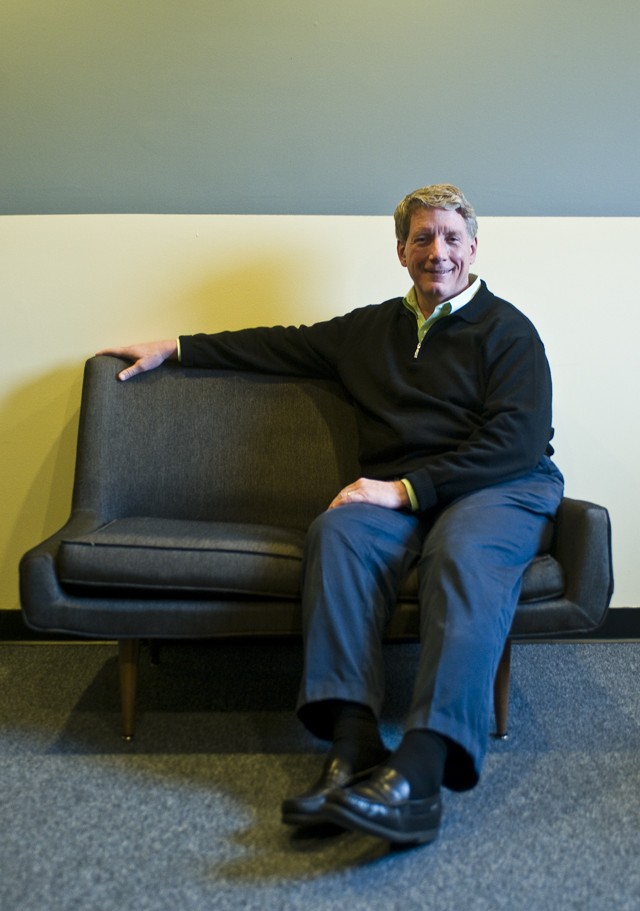Steve Kelley officially announced his candidacy in the 2010 gubernatorial race last week, adding another name to the growing list of DFL hopefuls. A former state legislator, Kelley has spent the last two years at the Hubert H. Humphrey Institute at the University of Minnesota teaching two courses and directing the Center for Science, Technology and Public Policy.
Kelley sat down with the Daily Friday to talk about his campaign.
Why have you decided to run for governor?
The state has a lot of challenges and we need the right kind of leadership to help the state reach its full potential.
And you think youâÄôre the right kind of leader?
I do. One advantage I bring to the job is in the Legislature, I worked on the full range of issues that a governor will have to face: energy and environment, economic development, health care and education. At the Humphrey Institute, I teach public budgeting. My experience covers the spectrum of issues. Also, I won election in a suburban district where you had to get both Democrats and independents to vote for you to win and I think thatâÄôs the key to actually winning the governorâÄôs race in 2010.
How do you perceive your competition âÄî youâÄôre up against candidates like the Speaker of the House and an expected run from Mayor R.T. Rybak.
TheyâÄôre both good people but in terms of their political support, theyâÄôre nowhere near where Attorney General [Mike] Hatch was in 2005 and 2006. With so many candidates in the race, itâÄôs still a challenge to reach out to delegates and communicate why IâÄôll be both the best candidate and the best governor. But I think thatâÄôs doable.
If you donâÄôt get the nomination, will you respect the partyâÄôs nod?
IâÄôve told people that IâÄôm going to keep my options open. IâÄôm not committed to running in the primary; IâÄôm just not committing one way or the other at this point.
What do you think the important issues are in this race?
Certainly getting Minnesotans back to work. The unemployment rate is still really high and it has been going on long enough that weâÄôre at the stage where people canâÄôt meet their mortgage payments, they canâÄôt make their rent payments âĦ
Education is a critical issue because we need to ensure that all of our kids have an opportunity to be successful and that we have a workforce that is attractive to employers that can be highly innovative and highly productive. You canâÄôt get that without high-levels of education and training.
Health care is a huge issue particularly at the national level right now âĦ MinnesotaâÄôs in a really good position to take the federal solution and be the springboard for new ideas and new solutions in controlling costs and improving the delivery of care âĦ
Energy and environment issues are critical. We canâÄôt âĦ leave future generations with the problems of climate change or some of the things weâÄôre doing to our water. So, weâÄôve got to change course on energy and other environmental issues.
Do you think that your break from the role as lawmaker will be to your advantage?
When youâÄôre in the Legislature, the pressures to get things done and the political pressures oftentimes donâÄôt give you a chance to reflect on what youâÄôre doing. So the chance to take a step back and learn more and learn some new things will make me a much more effective governor.
Do you think youâÄôre up to the budget challenge that is facing Minnesota, if youâÄôre elected governor?
I do. No governor can do it alone. The governorâÄôs got to provide the leadership. But I understand both the broad outline of the challenges that we face, the background of how weâÄôve dealt with these problems âĦ and IâÄôve also got a chance to look at how other states have addressed those challenges. I think IâÄôm well prepared.
What do you think about the governorâÄôs unallotment powers?
If itâÄôs not legally unconstitutional, itâÄôs philosophically unconstitutional. âĦ Putting all the power in one branch is wrong and the way the governor exercised that power is morally wrong and politically wrong in a democracy.
If you were elected, what attitude would you have toward higher education?
IâÄôm a big supporter of education at all levels. Students need an opportunity to get some education after high school in order to be successful in this economy. Minnesota and the country need many more of our citizens to graduate from some kind of post-secondary âĦ That means making it affordable, making sure itâÄôs always high quality and making it more convenient âÄì that we deliver the right kind of education to students when they need it.
What do you think your biggest challenge will be between now and the election?
It will be making my message clear enough so that DFLers and other Minnesotans can see why I would be both a better candidate and a better governor than the other folks that are running for the DFL. IâÄôm confident that I can win âĦ in the primary and in the election, but right now getting some separation between the other candidates and myself looks like the biggest challenge.







